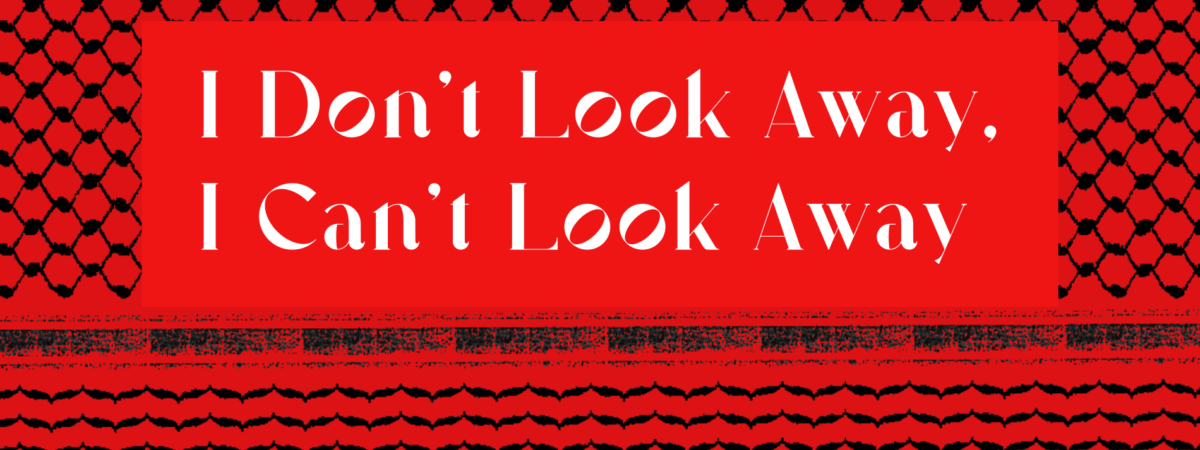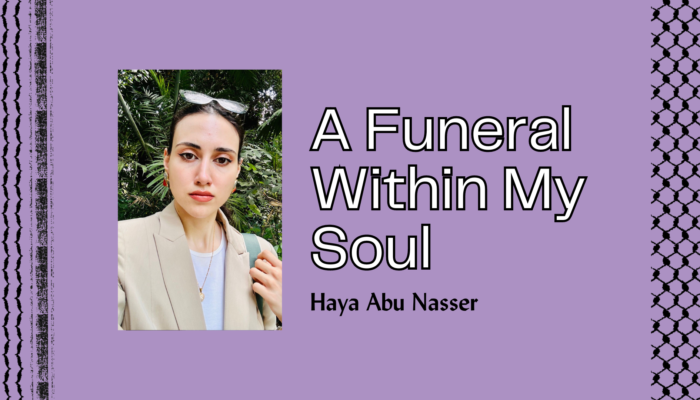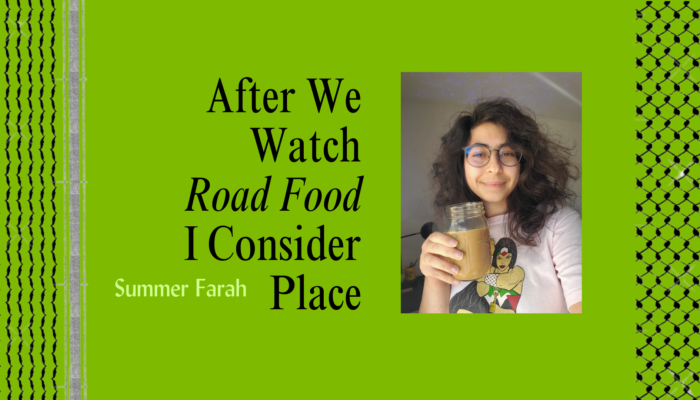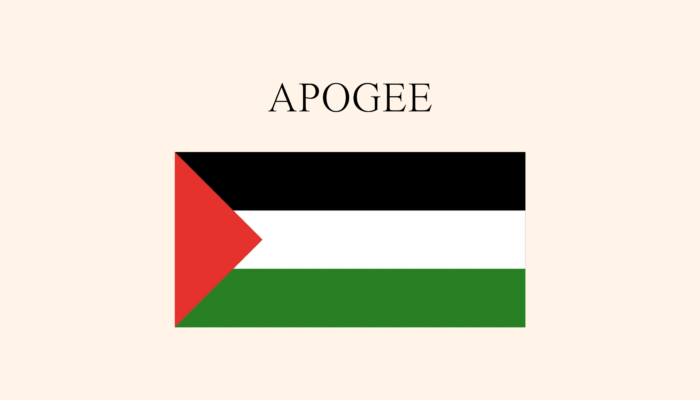At Apogee, we affirm our solidarity with Palestinian liberation, and are committed to speaking truth to power. As such, we hope to provide a home for works about Palestine or by Palestinian authors. We share the first of these pieces today, an essay by Elena Dudum which was contracted to be a part of a three-part column on Palestine by a different journal. In the wake of October 7th, Elena’s column was canceled. If you have a piece on Palestine that is being censored, please email editors@apogeejournal.org and we would be grateful to consider your piece for publication. We are offering an honorarium of $150.
In solidarity,
Apogee Journal
Back when my face was framed by short bangs and straight, shoulder-length black hair—a stage in life when my mother had jurisdiction over my personal choices—I did not know that the word “occupied” typically preceded the word “Palestine.” I did not know that the word “Palestinian” was routinely followed by the words “terrorist,” “militant,” and “gunman.” I did not know that soldiers from Israel’s occupying army controlled, berated, and dehumanized Palestinian people as they moved them like cattle in and out of designated Israeli checkpoints.
I did not know about the illegal twenty-five-foot wall Israel built that snakes deep into the occupied West Bank to include illegal Israeli colonies on the Israeli side, effectively annexing almost 10 percent of the West Bank, and separating Palestinians on the wrong side from their families and land. I did not know about the multitude of identification systems used to monitor and surveil Palestinian bodies and cars. I did not know that possession of an Israeli identification card and license plate could open some doors while slamming others shut forever—restricting Palestinian access to family, resources, and freedom. Yet I still somehow knew that getting into Palestine was difficult, if not impossible. This was my inheritance.
Instinctively, I imagined Palestine as a forbidden land, a mystical place that was, perhaps, too important for maps, which is why I could never find it in any of my school atlases. I grew up believing ardently that magic existed. Santa Claus was always a possibility even in the face of friends and siblings telling me otherwise. Palestine, like the North Pole, seemed just as mythical and untouchable—only those who knew its latitudinal and longitudinal coordinates, those who were clued in on the secret of where it existed, could find their way back.
Now, as an adult, my magical search for Palestine’s secret entrance has vanished.
Now, as an adult, I have learned the erased geographical coordinates of its land. Give me a pen and with my eyes closed I can draw Palestine’s borders before the 1948 United Nations Partition plan. I know where many of us once existed, and I know where my people try to return today.
Now, as an adult, I know the ways in which one may struggle to get back to their homeland, as well as the bitter need to leave it behind.
As an adult, I know all of this while also feeling the impossible weight of never knowing enough.
I fear I may never know enough.
* * *
I tell myself that I’ve been trying to find my way back to Palestine for the sake of my grandparents, who were forced to leave their homes, land, and lives. Sometimes I tell myself it’s for my parents, who didn’t get the chance to be born and raised on the land that they’ve recreated in their imagination and passed down to me, a creation only possible through broken memories that their parents—my grandparents—sparingly shared.
But perhaps I’ve been trying to find my way back to Palestine for myself, to make up for the comforts and freedom I’m afforded in my Brooklyn apartment, far away from the daily injustices and violence of occupation—which have persisted without respite for more than half a century, regardless of whether Western governments and media pays them any mind. Sometimes I’ve been trying to find my way back to Palestine in my doom-scrolling. How much can I read and see to make it enough? How many poorly titled tabloids written in the passive voice about Palestine can I consume to fill this gap? How can I possibly make up for the fact that I am not there, living in Palestine, enduring Israeli occupation?
Sometimes, on good days, I try to find my way back to Palestine through food. I’ll make anyone a Palestinian dish if they’re open to it—as long as they’ll also let me tell them about my teta, who in 1948, when she was only 14 years old, barely escaped Palestine with her parents on a small boat that almost capsized on its way to Egypt. Can I tell you about my teta who taught me to roll the grape leaves just tight enough so that the stuffing stays held in the pickled grape leaves’ veiny skin, but not too tight, so that the flavor from the all-spice and lemon-flavored tomato sauce can seep its way into the meat and the rice and make it so tender and juicy and mouth-watering that even as a vegetarian my mouth can’t help salivate anytime I think about it—can I tell you about my teta? In any way I can, I’ve been trying to find my way back.
Back. We’re always trying to go back.
“Have you ever been back home?” Palestinians ask each other when they meet. The reply is often, “No, not yet. Soon.” It always seemed to me that until one “goes back home,” we Palestinians remain in stasis—forever waiting in our longing. I’m asked if I have ever gone back home, even as someone who was not born there. It’s presumed that the Palestinian pull toward their ancestral land runs deeper than the geographical consequences of ethnic cleansing. Home is always home even for those of us who’ve been fortunate enough to call other places home.
“You have to tell them why you care so much,” my siblings say. “Your readers won’t understand why you feel all-consumed by Palestine, why you can’t get it out of your mind.”
“It’s guilt,” I say. My siblings say they don’t necessarily feel guilty, perhaps because their anger overshadows everything else. And when they aren’t fueled by rage at apathetic friends or by the skewed headlines they read on the news, they feel helpless. Helplessness—sometimes I think that’s just another shade of guilt. Or at least that’s what I find when my anger subsides.
My body exists in extremes: too anxious to sit still and type, too emotionally exhausted to socialize, and yet never tired enough to fall asleep. But my body is still alive, my heart still beats, and my mind still turns, no matter how much weed I’ve consumed to shut it off. I remind myself that this is a blessing, that this is, perhaps, a version of the American dream my grandparents hoped for. It’s a bittersweet dream to have and hold.
I subscribe to various email newsletters that deliver Palestine’s current events. Weekly, I receive updates on new Israeli laws that make it easier to revoke permanent residency for Palestinians, Israeli soldiers harassing and brutalizing Palestinians, or the new ways that the United States supports, financially and otherwise, Israel’s oppression of my people. These are stories I never receive from New York Times, CNN, or MSNBC push notifications.
To fill the gaps between these weekly newsletters, I log into the database of B’tselem, one of Israel’s most respected human rights organizations. It’s become a tic. It’s just as easy for me to log into Instagram for a hit of social dopamine as it is for me to head to B’tselem’s fatalities data, a web page that’s pinned on my browser. More often than not, I choose the latter.
Founded by Israeli lawyers, doctors, and academics in 1989, B’tselem is an independent, non-partisan organization that has carefully documented the human rights violations committed by Israel. B’tselem gained international attention when they published a report in 2021 in which they called Israel an “apartheid regime” and a non-democratic state devoted to “Jewish supremacy.” Though originally they focused on the occupation in the West Bank and Gaza, B’tselem expanded its focus to include everything between the Mediterranean Sea and the Jordan River, claiming that “the entire area that Israel controls is ruled by a single apartheid regime, governing the lives of all people living in it and operating according to one organizing principle: establishing and perpetuating the control of one group of people—Jews—over another—Palestinians—through laws, practices, and state violence.” Their conclusion echoes what Palestinians have been saying for decades and is part of a growing consensus among human rights groups such as Amnesty International and Human Rights Watch.
Their website maintains two main databases. One tracks the number of Palestinian homes destroyed by Israel in the occupied territories, and the other tracks Palestinian and Israeli fatalities. My tic takes me to the page that documents the climbing number of Palestinians killed by Israeli soldiers and settlers across the region. As of February 2023, B’tselem recorded that Israeli forces had killed a total of 10,119 Palestinians since they began documenting fatality data in September 2000. I click back in time to find some of the victims whose names I may recognize from the news, and others whose lost names, voices, and lives were never spoken of or mourned in the West.
“Jana Majdi ‘Issam ‘Assaf—15-year-old resident of Jenin. . . . shot in the head and chest by an undercover Border Police officer while standing on the roof of her house, while an exchange of fire was taking place several hundred meters away between armed Palestinians and soldiers and Border Police officers who had entered the city.”
Refresh.
10,120 dead.
“Diyaa Muhammad Shafiq Rahimi—16-year-old resident of Beit Rima, Ramallah and al-Bira District. . . . Fatally shot in the back and abdomen by soldiers in an ambush after, according to the military, he and other teens threw stones and paint canisters at a road next to the village of ‘Abud. Three teens were wounded by the gunfire and one of them was arrested.”
Refresh.
10,124 dead.
“Jamil Najm a-Din Jamil Nijem—3-year-old resident of Jabalya R.C., North Gaza District, killed. . . . by a missile fired from an aircraft. Did not participate in hostilities. Additional information: Killed by a missile along with three relatives and a neighbor, all minors, while at the al-Falujah Cemetery near their homes.”
I can’t refresh again. I don’t.
In 2022, Israeli soldiers and settlers killed a total of 231 Palestinians in the occupied territories. B’tselem’s investigation found that Israel’s killing was “unlawful and immoral and cannot be justified. Eight were killed on their way home or strolling nearby, four while trying to enter Israel without a permit, and six while documenting Israeli forces entering Palestinian communities or ensuing confrontations, or while watching the latter.”
In January and February 2023, Israeli soldiers and settlers killed, on average, more than one Palestinian every day. In May, Israeli soldiers demolished a donor-funded Palestinian school in the West Bank, six years after it had been previously destroyed and rebuilt. The UN Office for the Coordination of Humanitarian Affairs (OCHA) recorded that Israel’s occupying army had destroyed over 290 Palestinian homes and structures in the West Bank and East Jerusalem from January to March 2023.
Every month I think I’ve read enough, I think I’ve shared enough to help people see what I see. But I keep going. I don’t stop because no amount of humanizing this data changes the fact that Western media still doesn’t care. Another month goes by and I learn that in June 2023 a 14-year-old Palestinian girl in Jenin was standing outside her front yard recording Israeli soldiers driving past her home. As they drove past, one of the soldiers shot her in the head. The girl died two days later. There was no confrontation between Israeli soldiers and Palestinians at the time of this murder. There was no accountability afterward either. Israeli soldiers are rarely held accountable for their crimes. I stare at the photo of the young girl. Her name was Sadil. She looks like my niece. She looks like me. She looks like all of us.
The UN recorded that within the first six months of 2023 there were 591 settler attacks in the occupied West Bank resulting in Palestinian casualties, property damage, or both. This is an average of 99 incidents every month, which is a 39 percent increase to the monthly averages in 2022, an average that was already at the highest it had been since OCHA started recording such numbers in 2006. In fact, these numbers have risen each year since 2017.
In July 2023, Israeli soldiers killed three Palestinians over the course of forty-eight hours—19-year-old Badr Masri in Nablus, as residents confronted soldiers raiding the city; 16-year-old Mohammad Al-Bayed, in the village of Umm Safa, while participating in a weekly demonstration against illegal Israeli settlement expansion on their land; and 18-year-old Fawzi Makhalfeh, near Nablus as he was driving with a friend around midnight.
In August 2023, the United Nations reported that there are 645 obstacles to Palestinian movement spread across the West Bank, including dozens of checkpoints, roadblocks, earth-mounds, and trenches, all of which restrict access to main roads, city centers, and Palestinian-owned farmlands. Meanwhile, Israeli settlers living in the same territory in violation of international law aren’t subject to these obstacles and can move about freely.
In September 2023, five Palestinians were killed in an explosion during protests at the Gaza border fence. The Israeli army denied involvement. September 30 marks the day in the year 2000 that Israeli occupation forces murdered a 12-year-old Palestinian boy, Muhammad al-Durrah, who sat crouched in his father’s lap while his father hid behind a concrete pillar and tried to shield his small son from a stream of bullets. Today, Muhammad would have been 35 years old.
As of October 1, 2023, the Palestinian death toll for the year stood at 240.
On October 7, 2023, Hamas fighters entered Israel from Gaza, which along with the West Bank and East Jerusalem, has been under Israeli military occupation since 1967, and a draconian, suffocating siege and naval blockade for more than fifteen years—a siege that humanitarian organizations and others haves referred to as an open-air prison, a siege that human rights groups and the UN have condemned as collective punishment and illegal. It was a horrific attack in which over 1,200 people lost their lives. Violence that sadly might have been preventable had the international community acted sooner.
People can only be subjugated, oppressed, and pushed so far before they push back, with some taking extreme measures because of the extreme conditions they have been subjected to. If the United States and international community had taken serious action to end Israel’s brutal occupation, siege, and apartheid system—which the United States has been enabling, aiding, and abetting for seventy-five years—we might not have reached this explosive point where many Palestinians, particularly in Gaza, felt they had nothing left to lose.
As Palestinian-American human rights attorney and scholar Noura Erakat recently Tweeted, “Any condemnation of violence is vapid if it does not begin & end with a condemnation of Israeli apartheid, settler colonialism, and occupation.”
Lives are lives are lives are lives, we all keep saying, until nothing actually comes of these chants, until Israeli civilian lives prove yet again to be more valuable to the American government and media than the tens of thousands of Palestinian lives that have been stolen for over seventy-five years.
We cannot ignore the fundamental causes of recent events. Hamas is not at the core of the problem to be resolved. It is a symptom of the problem. Hamas did not exist until the late 1980s following the outbreak of the first Intifada, which was the Palestinian uprising against Israel’s then two-decade-old occupation—an insurgence that was four decades after the beginning of Israel’s apartheid system. In fact, Israel tacitly supported Hamas when it began to serve as a rival to the secular Palestine Liberation Organization (PLO), internationally recognized as the sole legitimate representative of the Palestinian people, as part of a strategy to divide and conquer. Rather than acting as a positive, peacemaking force in the region, the United States and other Western governments have continued to arm and fund Israel and provide diplomatic shielding at international forums like the UN and the International Court of Justice.
As of November 16, 2023, Israeli occupation forces have killed over 14,100 Palestinians in Gaza since October 7—that’s one out of every 200 people who lived in Gaza. I know that as I type these words this number is incorrect, it’s too low. According to the Defense for Children International, the number of children murdered stands at over 4,400.
* * *
“You’re making yourself sick,” my mother says, “consuming all of this tragedy.”
“But I can’t look away,” I remind her. I won’t look away, although sometimes I try.
Recently, I’ve turned to YouTube—a wonderful place to find new hobbies and a form of deliberate avoidance. I spend hours watching YouTubers weave multi-colored yarns—over-under-over-under-over-under—only for them to then show me how to pull out the strands where they’ve made a mistake, proving to novice viewers just how forgiving this new craft can be. I learn that the threads hanging vertically from top to bottom are called the weft. In order to become a weave, the horizontal threads, the warp, must wrap themselves between the vertical weft strands. Without the warp holding the hundreds of threads together into a final product, the long weft strands hang loose, cut from their original spool of thread, anchored to nothing but their individual existence. So this is what we look like, I think to myself. This is the amorphous Palestinian identity. This is the diaspora.
Every time violence erupts in Palestine and Israel in new and more frightening ways that make Americans uncomfortable and take pause from their day-to-day lives, I receive text messages from friends and acquaintances asking if I’m okay—these messages are appreciated, though often too little, too late. Either I don’t respond, or if I do, I simply share that I am devastated. The real answer is no, I am never okay. Sometimes they’ll ask if I have any family left in Palestine, living through this latest episode of violence—new only to them but a constant in the lives of Palestinians living under Israeli rule. Maybe if I did have family there, my broken heart would make more sense to them, as if the ghostly existence of my ancestors once living and tending to that land is not enough to cause pangs of heartbreak and devastation in my body today.
No, they were expelled, I say. They left and now I am here, like every other Palestinian in the diaspora—anchored to nothing, no homeland, no archived history that’s not been sanitized and skewed for international consumption, no weave that threads us together in community. This is the diaspora.
Like any good New York City apartment dweller, I use the space behind my couch as storage. There, I keep a basket of random craft materials—paint brushes, threads, wooden knitting needles, balls of yarn I haven’t touched in years. These items gather dust and intention. Lately, the basket sits by my desk so that when I have a knee-jerk reaction to leave—to do anything other than sit and make sense of Palestine’s history and where it all started and how we even got here, and what I’m supposed to do when a peer asks, “Well, who started the war? How can they be mad if they started it?”—I turn to my knitting. More rows have been knit out of deliberate avoidance than relaxation. But my knitting, my weaving, my crafts—they can all only take me so far.
How can I write amid this tragedy and make someone care? How can I make someone understand? In between my tic to refresh these fatality numbers (now too many for any database to count) and lose myself down the rabbit hole of learning who each of these Palestinians was, I close my eyes and imagine what liberation might feel like. I have no reference for it. But I imagine it feels uncomplicated, warm—like returning home. Yes, I imagine it feels like home.




